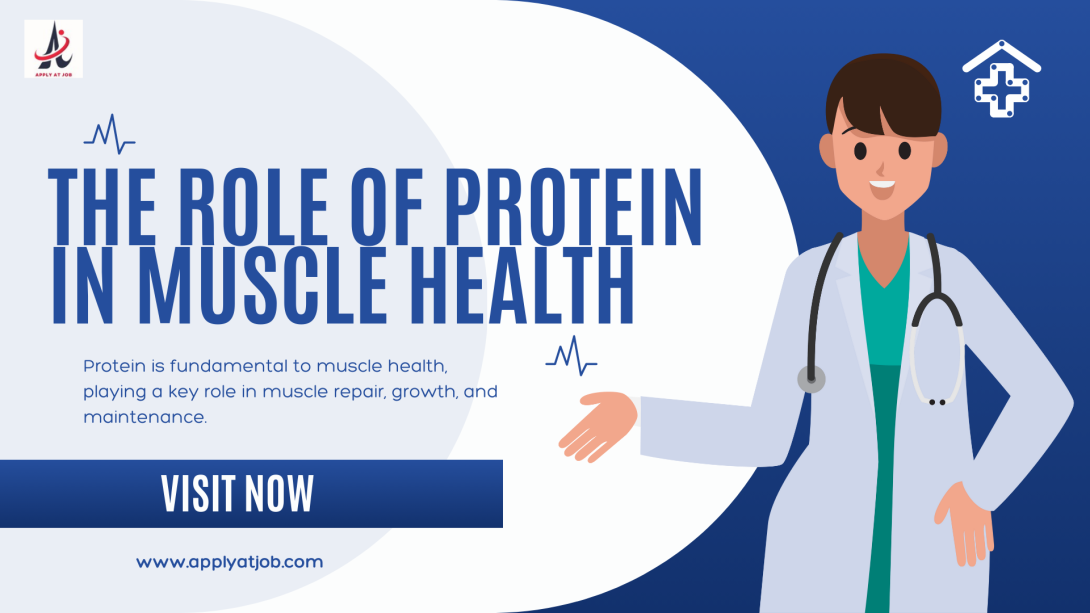
A Complete Guide on the Role of Protein in Muscle Health:
Muscle health is one of the most important aspects of body functioning for which protein is a vital macronutrient. Optimizing your fitness and general well-being requires an awareness of the function that protein plays in muscle health, whether you're an athlete trying to gain strength or a non-athlete trying to retain muscle mass as you age.
We'll discuss the benefits of protein for healthy muscles, the ideal sources to get it from, when to consume it, and how to schedule it for greatest effects in this blog.
Why Is Protein Vital for Healthy Muscles?
Proteins, especially muscle fibers made up of smaller units called amino acids, are what make up muscles. The building blocks (amino acids) required for muscle development, repair, and maintenance are found in protein. Your muscles get tiny injury every time you exercise, be it running, weight training, or even just walking. These tissues are strengthened and made more robust with the aid of protein in their healing.
Here's how muscular health is supported by protein:
1. Muscle Growth (Hypertrophy): Your muscles deteriorate during resistance exercise, such as weightlifting. Hypertrophy is the process of rebuilding these muscles with greater strength, and protein is essential to this process.
2. Muscle Repair: The tissues that make up muscles deteriorate with exercise. Protein's amino acids aid in mending these rips, promoting quick muscle recovery.
3. Muscle Maintenance: Sarcopenia, or the normal loss of muscle mass with age, is a condition that occurs in the body. Getting enough protein in your diet helps maintain your strength and muscle mass over time.
4. Preventing Muscle Wasting: Muscle wasting can happen in situations like sickness or extended periods of inactivity. Consuming protein during these periods is essential to reducing muscle loss.
What Is Your Need for Protein?
The quantity of protein needed for healthy muscles varies according to age, degree of exercise, and fitness objectives. To help you decide how much protein you need, consider the general parameters listed below:
1. People in General:
For proteins, the Recommended Dietary Allowance (RDA) is 0.8 grams per kilogram of body weight. At 70 kg (154 lbs), that works out to about 56 grams of protein a day for that person.
2. Active People and Athletes:
Protein requirements rise for those who engage in endurance sports or strength training. One gram to two grams of protein per kilogram of body weight is advised by experts. This translates to 84–140 grams of protein per day for an athlete weighing 70 kg.
3. Senior Citizens:
Age-related muscle loss increases, thus maintaining muscle mass may need older persons to consume more protein. For healthy older individuals, the recommended amount is often between 1.0 and 1.2 grams per kilogram of body weight.
4. Those who are trying to gain muscle or bodybuild:
Aim for the upper end of the spectrum, or around 1.6 to 2.2 grams of protein per kilogram of body weight, if muscle growth is your objective.
Top Protein Sources for Healthy Muscle:
Proteins are not made equally. Amino acids make up proteins, and certain proteins are comprised of all nine necessary amino acids, which are not produced by the body naturally. We refer to these as full proteins. The top sources of protein are as follows:
1. Complete proteins derived from animals
. Lean Meats: High-quality protein may be found in chicken breast, turkey, lean beef cuts, and pork.
. Fish & Seafood: Shrimp, cod, salmon, and tuna are all great sources of protein and omega-3 fatty acids, which aid in the repair of muscles.
. Eggs: Eggs are one of the most readily digested protein sources and contain all necessary amino acids.
. Dairy Products: Milk, Greek yogurt, and cottage cheese are high in protein and can aid in the healing of muscles.
. Whey Protein: Because of its rich amino acid profile and quick digestion, whey protein, a byproduct of cheese manufacture, is regarded as one of the greatest supplements for building muscle.
2. Complete and incomplete plant-based proteins
Legumes: Good plant-based protein sources include beans, lentils, and chickpeas. A full amino acid profile can be obtained by serving them with grains, such as quinoa or rice.
. Soy Products: High in protein and regarded as complete plant-based proteins are tofu, tempeh, and edamame.
. Quinoa: A pseudo-grain that is high in protein and suitable for vegetarians and vegans, quinoa has all nine necessary amino acids.
. Nuts and Seeds: High in protein and good fats include almonds, chia seeds, and hemp seeds.
3. Supplements with Protein
Whey protein is a quickly digested protein that is great to consume after working out.
Casein protein is a slow-digesting protein that is frequently taken in the evening to help with muscle regeneration.
. Plant-Based Protein Powders: Pea, hemp, and brown rice protein powders are great substitutes for people who are lactose intolerant or vegan.
Conclusion:
Protein is essential for maintaining, growing, and repairing muscle. It is also essential for overall muscle health. Making sure you get adequate protein is crucial whether you're an athlete, an older adult trying to maintain muscle mass, or someone recuperating from an accident. To maximize muscle health, make high-quality protein sources your first priority, spread out your intake throughout the day, and match your protein intake to your activity level. You can keep your muscles strong and healthy for the rest of your life if you maintain the proper balance between protein, exercise, and rest.
You can visit our site: Applyatjob.com
https://applyatjob.com/hiring-employee
https://applyatjob.com/jobs




